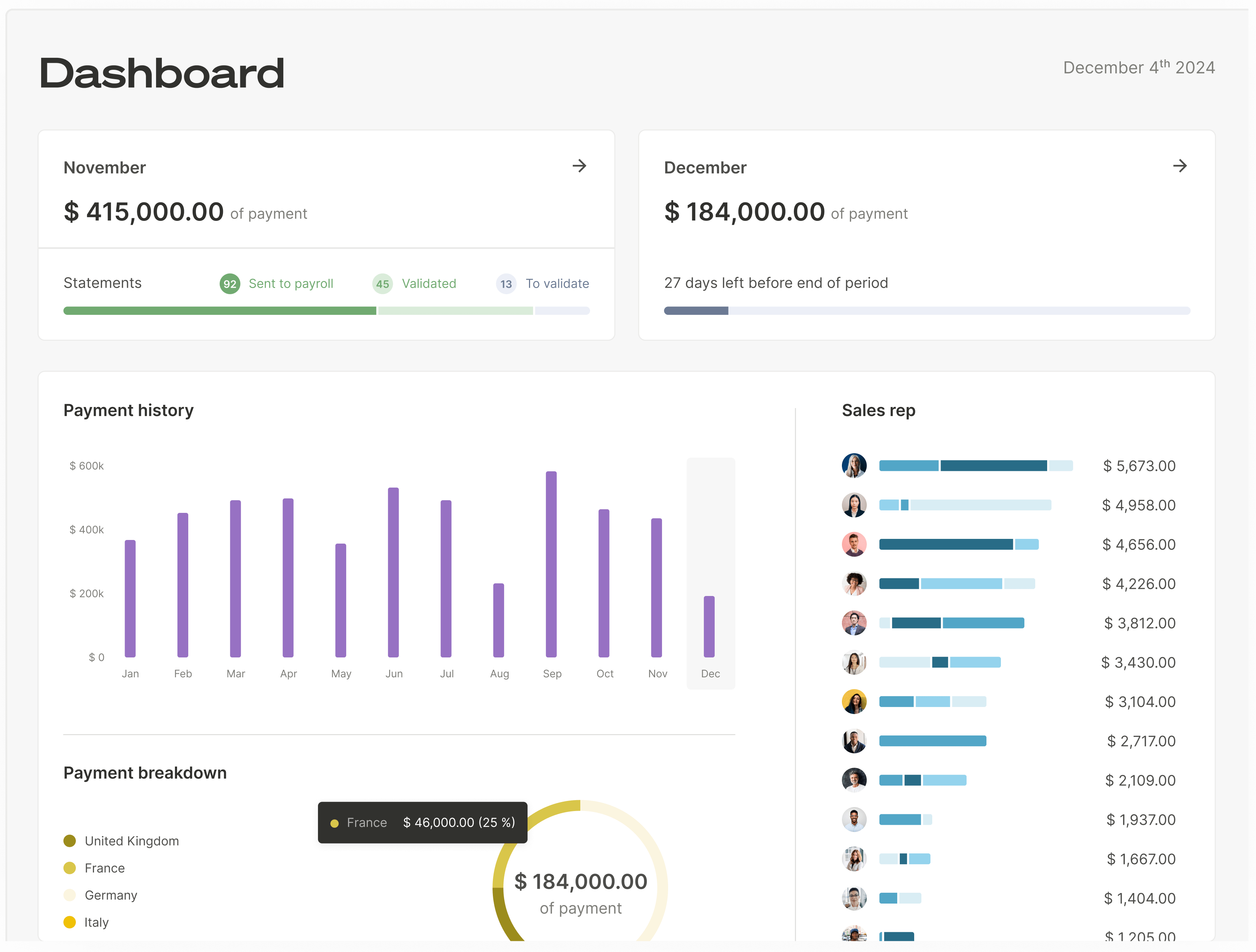Webinar (Tuesday, March 10): How ElevenLabs and n8n Run Commissions at Scale with Qobra
Register1. Internal communications
Internal communication is a crucial step in ensuring the adoption and success of any new sales commission plan. The way in which you present this change to your teams can have a significant impact on their motivation and performance. It is therefore essential to explain the new plan properly to your teams in order to create a climate of trust and enthusiasm around this transformation.
a. How do you explain the new sales commission plan to your teams?
Clarification of objectives and reasons for changing
Before any presentation is made, it is essential to clarify the objectives of the new plan and the reasons for the change. Whether it's in response to changes in sales strategy, a drop in performance, or a need to adapt in the face of high turnover, each reason must be clearly communicated.
Best practice
Organize a launch meeting where you present the challenges of this new approach. Use hard data: for example, explain how a more flexible pay structure can improve employee satisfaction, reduce turnover and, as a result, boost sales reps. This could be accompanied by testimonials from sales reps who have experienced similar changes in other companies, illustrating the positive impact of a well-designed plan.
Training managers to act as effective intermediaries
Managers play a key role in passing on information about the new remuneration plan. It is essential to train them so that they can become effective relays of this new structure.
Targeted training will give managers an in-depth understanding of the new objectives, remuneration mechanisms and associated performance indicators. This will help them to answer their teams' questions and allay any concerns they may have.
Best practice
Organize training workshops where managers can ask questions and discuss best practice in supporting their teams through this transition.
b. Transparency on expectations and benefits
Transparency is essential for building trust within the team. Clearly communicate the new rules, the performance expectations, and how these will benefit not only individual performance but also collective performance.
Best practice
Present the new performance indicators and explain their importance as part of the overall sales rep strategy. By including concrete examples, such as illustrating the results of a high-performing team under the new plan, you can show how everyone can benefit from this new structure.
In short, internal communication around the new sales commission plan needs to be handled with care, involving teams from the outset, training managers to be effective relays, and ensuring total transparency about expectations and benefits. A well-structured approach will increase team buy-in and ensure the success of the new plan.
To find out more
Read our article "How to communicate a new sales commissions plan", and discover the best advice, best practices and methods for making your new sales commissions plan a real success.
2. Setting up monitoring tools
The implementation of effective monitoring tools is essential to ensure the successful execution of the new sales commission plan.
These tools will not only enable performance to be monitored in real time, but will also automate commission calculations to minimize errors and frustration within the teams. Here are the key steps for adapting commission management and reporting tools.
a. Adapting commission management and reporting tools
Define appropriate dashboards to monitor performance in real time
Dashboards are invaluable tools for visualizing the performance of sales teams. They should be customized according to the key performance indicators (KPIs) set out in the new sales commission plan. For example, it may be appropriate to track metrics such as sales achieved, the number of new customers acquired, or the customer satisfaction rate.
By providing a clear and instant overview of performance, dashboards enable teams to stay motivated and make informed decisions.
Automate commission calculations as far as possible
Automating commission calculations is a key factor in avoiding human error and frustration. With an automated system, data is extracted directly from customer relationship management (CRM) tools and linked to commission management software.
The practical tool
Qobra ensures that every transaction is properly accounted for, reducing the risk of misunderstandings and dissatisfaction among sales reps. In addition, Qobra offers a solution that links sales performance to commissions in real time, enabling teams to see instantly how their efforts are translating into financial gains. This not only increases transparency, but also employee confidence in the remuneration system.

"A sales commissions plan must be clear, simple, transparent and predictable in order to establish a climate of trust. You already need to give 100% visibility on the model, the amounts and the targets to make sure that everything is clear from the outset."
Vladimir Ionesco, Director of Global Sales Performance at Doctolib
"Qobra really helped us to gain the confidence of our teams because we could see their results on a daily basis. They had very clear visibility of the details of the calculations according to the Dashboard, but also of where they were at with their accelerators, for example. And that can motivate them, to say to themselves OK, if I do one more deal, that's going to potentially unlock the next accelerator for me."
Aude Cadiot, Revenue Operations Lead at Spendesk
Benefits of commission management tools
Implementing commission calculation and management software such as Qobra has a number of advantages for sales reps, operational and financial teams:
- For sales reps: They have instant visibility of their performance and potential commissions. This acts as a powerful motivator to meet and exceed targets. What's more, the ability to consult data in real time helps to reinforce their commitment to the remuneration plan.
- For operational teams: Automated calculations reduce the time spent processing commissions, freeing up resources to concentrate on higher added-value tasks.
- For finance teams: Commission management software reduces the risk of errors and facilitates the reporting process. With data centralized and updated automatically, it becomes easier to forecast commission expenditure and analyze the costs associated with sales performance.
"We have sales engineers, account managers, sales reps, everyone has slightly different plans but connected to each other. With Qobra, we can manage different models that we reuse for the same jobs, while being able to adjust a few small variables."
Tomas Hons, GTM Strategy & Operations Manager at Make
"Over 2022, we're averaging 123% individual performance, and Qobra is part of one of the links that provides this motivation and makes us perform on a daily basis."
Clémentine Platel-Paris, Head of Sales Southern Europe at Spendesk
In short, the implementation of appropriate monitoring tools and software such as Qobra is essential to ensure the success of the new sales commission plan.
These tools not only optimize performance monitoring, but also foster a climate of trust and transparency within teams, while reducing errors and maximizing the efficiency of commission management processes.

3. Performance monitoring and adjustments
Monitoring performance and adjustments is a crucial step in ensuring that the new sales commission plan remains relevant and effective.
This involves regular analysis of the plan's effectiveness, as well as proactive adjustment mechanisms based on the results obtained. Here are the key points to consider in order to optimize this phase.
a. Regular analysis of the plan's effectiveness
Tracking sales reps overall and by individual
To assess the effectiveness of a sales commission plan, it is essential to monitor performance at both global and individual levels. This means examining the sales results of the whole team as well as those of each individual sales rep. A good commission management system, such as Qobra, enables real-time analysis, making it easier to detect trends and anomalies.
"Qobra's dashboard system allows me, with just two clicks and a look, to be able to see how the remuneration of one person or several teams is evolving."
Thomas Mesnil, Sales Operations at Pennylane
For example, if a sales rep performs exceptionally well, this may indicate that the plan is well-designed to motivate certain behaviors.
On the other hand, if several team members are struggling to achieve their objectives, this may indicate a need for adjustment.
Analysis of the new plan's costs and profitability
It is also crucial to analyze the costs associated with the sales commission plan. This includes not only the commissions paid out, but also indirect costs, such as the time spent by sales teams on achieving their targets. By comparing these costs with the results obtained, companies can determine the profitability of the plan.
For example, if the cost of commissions exceeds the profits generated, this could indicate that the plan is not viable in the long term. By monitoring these indicators, companies can make the necessary adjustments to ensure profitability while motivating their teams.
Identifying potential bottlenecks
When monitoring performance, it is important to identify any sticking points. These could include over-ambitious targets, poorly defined commission levels or bonuses that fail to motivate sales reps. By gathering feedback from teams and analyzing the data, companies can identify areas where adjustments need to be made.
b. Adjustment mechanisms
How and when to adjust levels, objectives or structure?
Adjustments should be based on concrete data and feedback. For example, if a majority of the team fails to reach the commission thresholds, it may be a good idea to lower the thresholds or make them more accessible.
Conversely, if some sales reps regularly exceed their targets, it may be necessary to increase the thresholds to encourage them to perform even better.
Adjustment mechanisms must also be flexible. Companies should plan regular review points, for example every quarter, to analyze performance and make any necessary changes. This allows the plan to be adapted to changing market conditions, customer behavior and sales results.
Collecting internal feedback
It is essential to collect feedback from sales reps and managers after each evaluation cycle.
Teams need to feel involved in the adjustment process, and their feedback can provide valuable insights into how the plan is perceived and what needs to be improved. This fosters a climate of trust and encourages a culture of collective performance.
Want to know more? Sales commission plans: The ultimate guide








